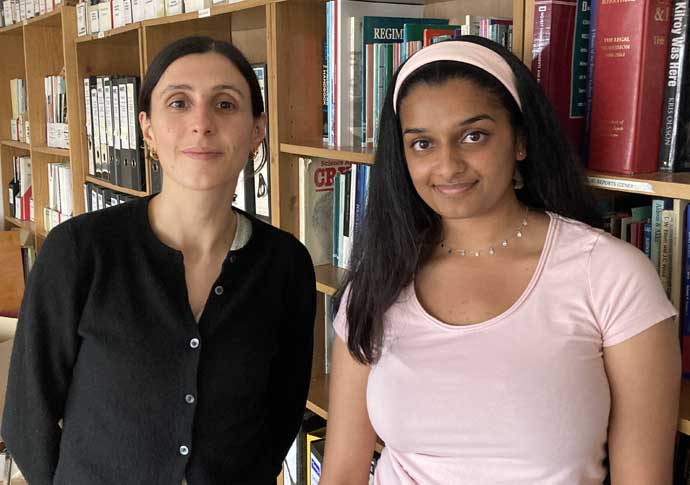‘Role of racism isn’t adequately considered in post-death investigations’
A Finsbury Park-based charity has contributed to a ‘vital blueprint’ that aims to overhaul the inquest system and cut youth violence
Friday, 12th May 2023 — By Charlotte Chambers

Jessica Pandian, right, of Inquest, with colleague Rosanna Ellul
A CHARITY in Finsbury Park that has spent the past 40 years fighting for the families of people who have died in police custody or prison has contributed to a major new study looking at how to reduce and ultimately end youth violence.
Inquest, based in Fonthill Road, is calling for the inquest system – the court hearings where investigations into sudden and unexplained deaths are held – to be “more truthful, just and accountable”.
In its paper, published two weeks ago in human rights charity Liberty’s Holding Our Own guide, Inquest also called for an overhaul into the way investigations are conducted into how and why people die in custody.
“The role of racism or discrimination in a death is not adequately considered – if at all – in post-death investigations,” report author and policy and research officer Jessica Pandian said.
“If these issues are not investigated, they cannot be addressed.”
Most unexplained deaths that occur in Islington are investigated at St Pancras Coroner’s Court in King’s Cross.
She said: “In our chapter we talked specifically about the marginalisation of young black people in illustrating how they died disproportionately in police custody and also how prior to that moment of death they are more likely to be arrested, stopped and searched, have force used against them, and be represented in youth custody.”
She also pointed out how “racialised tropes” about black people – and particularly those with mental ill-health – as being violent, mad, dangerous and “big and black” can “contribute or play a part in the death and lead to that person having an encounter with the police in the first place”.
Inquest made a series of recommendations that would, it argues, better serve young people. Among them is a demand to establish a Hillsborough Law, formerly the Public Authorities (Accountability) Bill, which would include a “duty of candour” on public authorities and officials.
“There is currently a culture of delay, denial and obfuscation among the police and their legal teams concerning post-death investigations,” she said.
But even if public bodies were open and honest, and their candour led to recommendations by coroners to prevent future harm, there is currently no enforcement body to ensure those changes have been followed up.
Those at Inquest want to see an independent body set up by government that monitors any learning that arises out of investigations into deaths, and it would also be a port of call for families.
Recent statistics show that in the year to March 2022, 122 people aged 16-24 died in the UK. Just under 40 per cent of that group were black, despite making up just 4 per cent of the population – making the homicide rate for black youths four times higher than that of white youths. While those 122 deaths are not necessarily state-related deaths, Holding Our Own argues that successive governments have failed young people.
“Instead of investing in young people or providing support to deal with the causes of social problems, the government has given the police more powers to try and tackle the symptoms of these issues,” it states.
While the guide – co-authored by nine organisations – calls for a roll-back on police powers, Ms Pandian also highlights the role of racism within the force, and the impact that has had on black communities.
She said: “For us, it’s not anything new. But it is really important that this guide is out now because I think with the murder of George Floyd and the Black Lives Matter protests and movement that surrounded it, the broader public is more aware of the fact of the violence and inherent racism that is intrinsic to policing.
“And I think more of the public is now also more aware that policing and the criminal justice system is perhaps not the solution to social ills in our society – we need to look elsewhere in order to really allow for people in our society, especially the most marginalised, to flourish.”
Calling itself a “vital blueprint for how we can undo the harm currently being done to our communities, and instead build a society where all children are given the chance to thrive”, Holding Our Own makes a series of demands, including ending school exclusions and ending drugs policing. It also calls for an end to cuts to youth services.